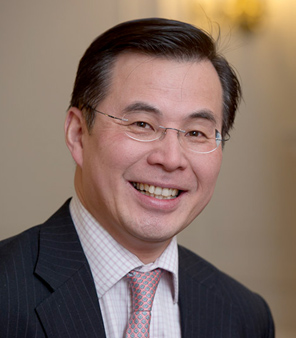Guang-Zhong Yang - iCore Inaugural Workshop Speaker
 Professor Guang-Zhong Yang (FREng, FIEEE, FIET, FAIMBE, FIAMBE, FMICCAI, FCGI) is director and co-founder
of the Hamlyn Centre for Robotic Surgery, Deputy Chairman of the Institute of Global Health Innovation, Imperial
College London, UK. Professor Yang also holds a number of key academic positions at Imperial - he is Director and
Founder of the Royal Society/Wolfson Medical Image Computing Laboratory, co-founder of the Wolfson Surgical
Technology Laboratory, Chairman of the Centre for Pervasive Sensing. He is a Fellow of the Royal Academy of
Engineering, fellow of IEEE, IET, AIMBE and a recipient of the Royal Society Research Merit Award and listed
in The Times Eureka 'Top 100' in British Science.
Professor Guang-Zhong Yang (FREng, FIEEE, FIET, FAIMBE, FIAMBE, FMICCAI, FCGI) is director and co-founder
of the Hamlyn Centre for Robotic Surgery, Deputy Chairman of the Institute of Global Health Innovation, Imperial
College London, UK. Professor Yang also holds a number of key academic positions at Imperial - he is Director and
Founder of the Royal Society/Wolfson Medical Image Computing Laboratory, co-founder of the Wolfson Surgical
Technology Laboratory, Chairman of the Centre for Pervasive Sensing. He is a Fellow of the Royal Academy of
Engineering, fellow of IEEE, IET, AIMBE and a recipient of the Royal Society Research Merit Award and listed
in The Times Eureka 'Top 100' in British Science.
Professor Yang's main research interests are in medical imaging, sensing and robotics. In imaging, he is credited
for a number of novel MR phase contrast velocity imaging and computational modelling techniques that have transformed
in vivo blood flow quantification and visualization. These include the development of locally focused imaging combined
with real-time navigator echoes for resolving respiratory motion for high-resolution coronary-angiography, as well as
MR dynamic flow pressure mapping for which he received the ISMRM I. I Rabi Award. He pioneered the concept of perceptual
docking for robotic control, which represents a paradigm shift of learning and knowledge acquisition of motor and
perceptual/cognitive behaviour for robotics, as well as the field of Body Sensor Network (BSN) for providing
personalized wireless monitoring platforms that are pervasive, intelligent, and context-aware.
Talk Title: "Body Sensor Networks - Reshaping the Future of Pervasive Healthcare"
Abstract: With demographic changes associated with the aging population and increasing number of people living alone, the requirement and practical provision of future healthcare delivery are changing rapidly. Shorter hospital stay and better community care is set to be the future trend of healthcare, however, providing specialist service at a local level is difficult, considering the relative infrequency with which a particular disease, or a combination of diseases, may be encountered by the average general practitioners. Such schemes must be underpinned by an intelligent and pervasive information link between patients and specialist centres through wearable or implanted wireless sensory devices to provide early warnings of potential problems. The provision of "ubiquitous" and "pervasive" monitoring of physical, physiological, and biochemical parameters in any environment and without activity restriction and behaviour modification is the primary motivation of Body Sensor Network (BSN) research. The general scope of BSN is broad, ranging from monitoring of patients with chronic disease and care for the elderly, to general well-being monitoring and performance evaluation in sports. It also has important applications in gaming and human-computer- interaction. This lecture will address the technical challenges related to biosensor design, power scavenging, and low power wireless communication; examine the need for autonomic sensing including context-aware sensing, mutli-sensor fusion and data mining; evaluate the challenges and opportunities of pervasive sensing for healthcare, general well- being and chronic disease management. The lecture will also cover the use of bio-inspired design for providing distributed inference and ultra-low power on-node processing, demonstrating how this alternate paradigm based on the strategies used by biological systems can be used to deal with the challenges of scale, complexity, heterogeneity, and uncertainty involved in pervasive sensing.